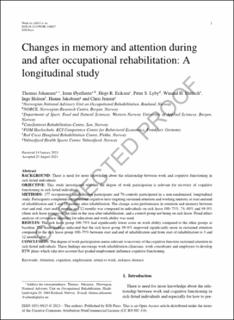Changes in memory and attention during and after occupational rehabilitation: A longitudinal study
Johansen, Thomas; Øyeflaten, Irene Larsen; Eriksen, Hege Randi; Dittrich, Winand H.; Holsen, Inge N.; Jakobsen, Hanne; Jensen, Chris; Lyby, Peter Solvoll
Peer reviewed, Journal article
Published version
Permanent lenke
https://hdl.handle.net/11250/3109867Utgivelsesdato
2023Metadata
Vis full innførselSamlinger
- Import fra CRIStin [3604]
- Institutt for idrett, kosthald og naturfag [1006]
Originalversjon
Work : A journal of Prevention, Assesment and rehabilitation. 2023, . 10.3233/WOR-230027Sammendrag
BACKGROUND: There is need for more knowledge about the relationship between work and cognitive functioning in sick-listed individuals. OBJECTIVE: This study investigated whether the degree of work participation is relevant for recovery of cognitive functioning in sick-listed individuals. METHODS: 177 occupational rehabilitation participants and 70 controls participated in a non-randomised, longitudinal study. Participants completed computerised cognitive tests targeting sustained attention and working memory at start and end of rehabilitation and 3 and 12 months after rehabilitation. The change score performance in attention and memory between start and end, start and 3 months and 12 months was compared in individuals on sick leave 100–75%, 74–40% and 39–0% (three sick leave groups) of the time in the year after rehabilitation, and a control group not being on sick leave. Fixed effect analysis of covariance adjusting for education and work ability was used. RESULTS: The sick leave group 100–75% had significantly lower score on work ability compared to the other groups at baseline. The main findings indicated that the sick leave group 39–0% improved significantly more in sustained attention compared to the sick leave group 100–75% between start and end of rehabilitation and from start of rehabilitation to 3 and 12 months after. CONCLUSION: The degree of work participation seems relevant to recovery of the cognitive function sustained attention in sick-listed individuals. These findings encourage work rehabilitation clinicians, work consultants and employers to develop RTW plans which take into account that graded employment influence cognitive functioning.
Beskrivelse
Corrected proof

